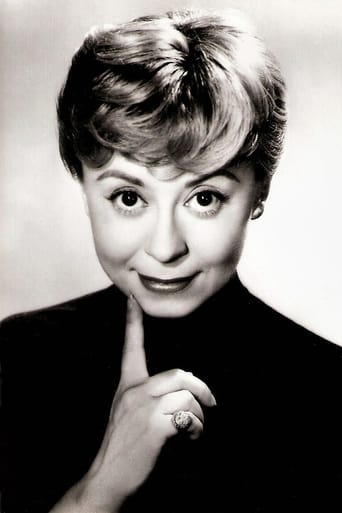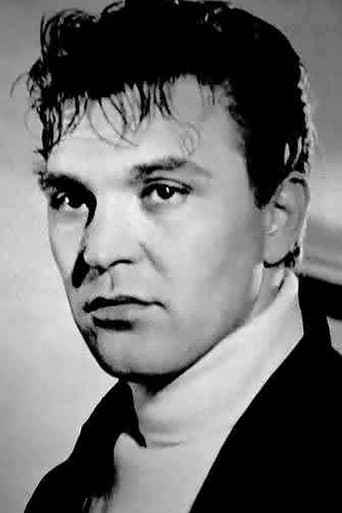federovsky
The later, nostalgic Fellini is always worth another look. How I want to like this more, a touching last adventure, albeit too late, that revives the old glories, ties up old emotions - a last irresistible chance to live. There's genius in the choice of subject: a couple of old dancing stars (Fellini favourites Mastroianni and Masina) have been invited to recreate their old act on a manic TV show. They prepare themselves physically and emotionally for this reunion, the last chance to tread the boards and feel the glory. This is Fellini - and his stars - well into old age, poised on the edge of oblivion, having got used, presumably, to irrelevancy, and now able to reflect wistfully on it all - even able to say a kind of goodbye. The homage to Astaire and Rogers is also a homage to cinema, and the idea of showing those old values displaced in the new tacky world of television is a fine ruse.Ginger (Masina) is immediately lost in this mad new world exactly as if she has stepped out of an old film. Outrageous advertising, rubbish piled in the streets, gangs of youths on motorbikes, the uncertainty of where they are being taken and what will happen to them - all nicely encapsulate the disorientation. The unstoppable madness of real life, it seems, is more Felliniesque than Fellini. When Mastroianni finally appears - after some anticipation - he is a sorry wreck of his former self. This is quite touching. They go over their old routine, feel the nerves once again, meet some old friends, get that sense of achievement for the last time.But what a hash Fellini makes of it, what a laborious rendering. It's a raucous gabble - treacle-think with yattering people who are really more irritating than cute. Yes, that's the theme: gentle nostalgia swamped by the manic, garish, loud, unstoppable modern world. But still, there had to be a subtler way of presenting an irritating world than irritating the audience. And let's be honest, this is his usual style. As usual, there are too many words in the script; there is barely a moment's rest from the breathless dialogue - most of it not as funny or quaint as it tries to be. It's never the words that raise a smile, but the silent moments that bring most out of the characters. If only Fellini had realised that.The inventiveness is desperate, and is only sporadically funny, nostalgic, or touching. Largely it seems like an excuse to parade a variety of freakish or eccentric characters, cramming in far too many of them. Group scenes are invariably chaotic and lack the precision and clarity of the old days, when black and white forced a more precise delineation of scene and character. What it lacks in crispness it tries to makes up for in sheer sensory experience, but it feels slapdash, and that feel is compounded, as always, by that terrible Cinecitta dubbing. This is not nearly the worst example, but it does appear slapped on at times like a veneer. Quite clearly the words they are mouthing are not the ones you hear; it is maddening and sometimes difficult to see who is talking from a distance, and, more importantly, it robs the serious characters of sincerity, and makes the flippant characters into cartoons. Some might take it as an element of style, a deliberately imposed artificiality implying that the characters are always bigger than their words - that's being overly indulgent.But it's hard to be too harsh. On the plus side, there is a fine arc to this film; it grows in meaning, matures, and finally blossoms into a delicate flower of nostalgia. There's great music, and the two stars, who are, you can tell, by nature wistful and gentle - that's enough. And I'm a big fan of railway station endings, having spent so long - whole nights often enough - enduring the loneliness of the long-distance traveller, even in Roma Termini the year this film was made. Everyone is benign - even the murderous mafia boss in handcuffs. Everyone has a beneficial role to play in society, a performance to make, no matter how freakish they are, how out of touch or out of date. Sure, the present makes a mockery of the past, but no more than the past, with more justification, makes a mockery of the present.I'm surprised I like Fellini. He's never critical of anything, no matter how stupid or weird, whereas I'm critical of everything, especially things human. He has no interest in the natural world, only in people, whereas I see everything, especially the human world, in the context of a bigger picture- nature - in which humans are just a few billion scurrying ants. So Fellini represents all the stuff that I have lost, or never gained - the side of me that got concreted over somewhere along the way; he is the antidote to misanthropy and ill-feeling of any sort, to all the misery that society, as a necessary by-product, tips upon itself; he is the little man getting his own back without bitterness. In short, he's good for the soul. Just a pity the producer or other person of influence didn't rein in much of the extraneous garishness (including the smutty jokes) here.People love the humanity in this film and will be prepared to overlook the directorial misjudgements. Fine. It must be nice to be so generous, but, in all honesty, from a filmcraft point of view, this could have been much better.
Anon Amos
Fellini in top form here. I don't know why this gets so much indifference. Along with "And The Ship Sails On," this might be one of Fellini's best films, up there with Juliet and 8 1/2. You should also check out Intervista. A story of two aging performers well past their peak of popularity team up after not seeing each other in decades to dance on a variety show. "Ginger," the lady, doesn't seem to even understand the nature of the show she's appearing and is baffled and disturbed by the circus freaks and transvestites. "Fred," the man, is bitter with age and a bit embarrassed that he doesn't have more to show for his life. He even threatens to derail their appearance to make a statement about what sheep the modern audience is. The stinging commentary on television and rampant commercialization is always in the background, and fortunately it's more of a cultural critique than a political one (I don't think Fellini had a political bone in his body). For me, the emotional core of the film is probably Fred's discussion with a bemused, condescending writer about the origins of tap dancing. I won't spoil it.
Furuya Shiro
They were a good pair of tap performance some 40 years ago. Though they slept together many times, eventually they parted without loving each other. One day, the man and the woman of the pair meet decades later. If you are either side of the pair, would you accept the offer for the TV show? They might have something to hurt themselves when they parted. If they meet in their forties, when they are still professional performers, the reunion could only remind them the bitter memory. But it seems they have already passed such age and situation.Rome is full of garbage. The TV studio is full of showy and mockery things. But this variety show becomes unforgettable time for them.Many times they are about to go away from the show, but eventually, when the TV studio is in turmoil of black out, they talk honestly, and they know they really wanted to see each other and dance again. When they dance, the face of Giulietta Masina is wonderful and impressive. And Marcello Mastroianni desperately dances not to fall again.While watching the movie, I recalled my own past and thought if I could someday see the woman who left me many years ago.
MartinHafer
This is a very enjoyable film for fans of Italian cinema, as two great actors who made reputations for themselves in earlier Fellini films return late in their careers for a very nostalgic romp. Giulietta Masina (wife of Federico Fellini) and Marcello Mastroianni play Ginger and Fred--a dance team that made a name for themselves imitating the dancing style of Ginger Rogers and Fred Astaire. The act had broken up more than three decades earlier, but they both agreed to be reunited for a TV program. Now, much older and not having seen each other for many years, they meet and renew old acquaintances.All the dialog and scenes between the two leads were very sweet and charming. Despite her age, Ms. Masina in particular looked great and was amazingly light on her feet, while her partner was obviously too old and rusty but he felt compelled to be there. Unfortunately, while their scenes together were great, it took until almost the middle of the film until they were reunited. In the meantime, tons of Felliniesque touches were dumped onto the screen and served to either delight Fellini's die-hard fans who want this or alienate people like me who felt they totally obscured the story. For example, on this variety show are a troop of dancing midgets (VERY Fellini-like), a transsexual, a kidnap victim with missing digits, an againg admiral, countless bad celebrity impersonators and lots of garish little touches that made it obvious that Fellini was NOT a fan of television--like a film made by kids who have severe ADHD since it has practically EVERYTHING. Additionally, throughout the film, lots of bizarre touches were inserted such as an irrelevant biker scene and a short clip at the beginning of the film of a billboard on which a sausage is penetrating a woman (look quickly--it's there).I guess I am just much more of a romantic. I really wanted to see more Masina and Mastroianni. Their interplay was excellent and charming and the dance routine was amazingly sweet and touching. I guess never having been a huge fan of Fellini's more surreal and indulgent films, the excesses and distractions of this film made it tough to rate it any higher.





